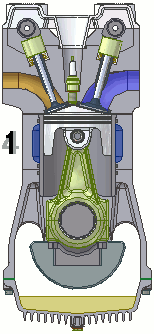4 STROKE ENGINE No.2 compression stoke and No.3 power stroke valves are closed.
|
No. 1 Intake
|
No. 2 Compression
|
No. 3 Power stroke
|
No. 4 Exhaust
|
|
EXHAUST SIDE -> |
On No.2 compression and No.3 power stroke
the valves are closed. You will notice the spark plug fires every other revolution. 
You want the engine to be on No.3 at the end of the power stroke. This way the piston is all the way down and the valves are closed. |
|
|
|
An optional way to check that the valves are closed.
The cycle begins at top dead center (TDC), when the piston is
The air–fuel mixture is then ignited near the end of the compression
|
|||